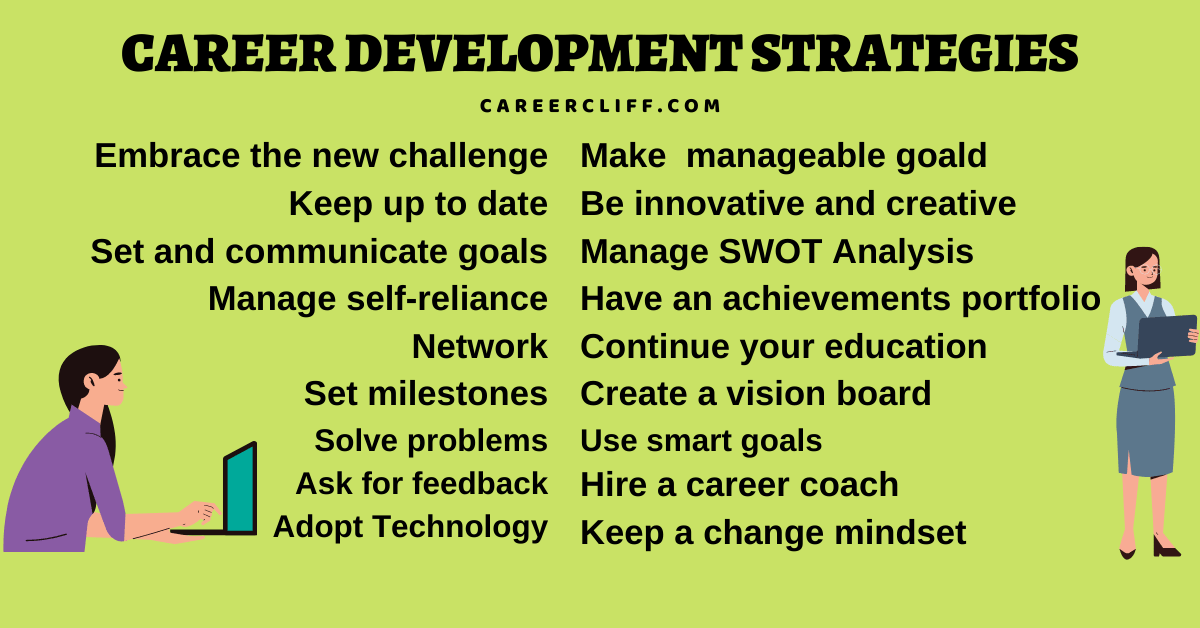Career Growth Strategies takes center stage in the quest for professional success, offering a roadmap filled with opportunities and challenges. Get ready to explore the secrets to climbing the career ladder with style and finesse.
Understanding Career Growth Strategies
In the world of professional development, career growth strategies are the game plan individuals or companies use to advance in their careers. These strategies involve setting goals, acquiring new skills, seeking out opportunities for growth, and making strategic decisions to propel one’s career forward.
Career growth strategies are essential for advancing in one’s career because they provide a roadmap for success. By identifying areas for improvement, setting clear objectives, and taking proactive steps to achieve them, individuals can position themselves for promotions, salary increases, and overall career satisfaction.
Examples of Successful Career Growth Strategies
- Continuous Learning: Successful professionals prioritize ongoing education and skill development to stay current in their field and remain competitive.
- Mentorship: Building relationships with experienced mentors can provide valuable guidance, advice, and networking opportunities to support career growth.
- Networking: Actively engaging with industry peers, attending conferences, and participating in professional organizations can help individuals expand their professional network and uncover new opportunities.
- Setting SMART Goals: Establishing Specific, Measurable, Achievable, Relevant, and Time-bound goals can help individuals stay focused and motivated to achieve career milestones.
Setting Clear Goals

Setting clear and achievable career goals is crucial for professional growth and success. It provides direction, motivation, and a roadmap to follow in order to reach your desired career destination. By setting both short-term and long-term goals, individuals can track their progress, stay focused, and make necessary adjustments along the way to ensure continuous growth.
Importance of Setting Clear and Achievable Goals
Setting clear and achievable goals helps individuals to define what they want to achieve in their careers and establish a clear path to get there. It allows for better prioritization of tasks, improved decision-making, and increased accountability. Additionally, clear goals provide a sense of purpose and direction, helping individuals stay motivated and committed to their professional development.
- Setting clear goals provides a roadmap for success.
- It helps individuals stay focused and motivated.
- Clear goals improve decision-making and prioritization.
- Goal-setting enhances accountability and commitment to career growth.
Setting Short-Term and Long-Term Goals for Career Growth
When setting career goals, it is important to consider both short-term and long-term objectives. Short-term goals allow individuals to focus on immediate tasks and milestones, while long-term goals provide a broader vision for the future. By balancing both types of goals, individuals can make steady progress towards their ultimate career aspirations.
- Short-term goals help in achieving immediate tasks and milestones.
- Long-term goals provide a broader vision for future career growth.
- Balancing short-term and long-term goals ensures steady progress and continuous development.
Tips for Setting SMART Goals for Career Development
Setting SMART goals is an effective way to ensure that your career goals are specific, measurable, achievable, relevant, and time-bound. By following the SMART criteria, individuals can create goals that are clear, actionable, and realistic, increasing the likelihood of successful achievement.
- Specific: Clearly define what you want to accomplish in your career.
- Measurable: Establish criteria to track your progress and measure success.
- Achievable: Set goals that are challenging yet attainable with effort and commitment.
- Relevant: Ensure that your goals align with your values, interests, and long-term objectives.
- Time-bound: Set deadlines and milestones to keep you on track and motivated to achieve your goals.
Developing Skills and Expertise: Career Growth Strategies
In today’s rapidly changing job market, it is crucial to continuously develop your skills and expertise to stay competitive and advance in your career.
Identifying and Developing Skills
- Assess your current skill set and identify areas for improvement.
- Research the skills that are in demand in your industry and align them with your career goals.
- Take courses, attend workshops, or pursue certifications to develop new skills.
- Seek feedback from mentors or supervisors to identify areas where you can enhance your expertise.
Staying Updated with Industry Trends
- Subscribe to industry publications, blogs, and newsletters to stay informed about the latest trends.
- Attend conferences, webinars, or networking events to connect with professionals in your field and learn about new developments.
- Join professional organizations or online forums to engage with peers and exchange knowledge about industry best practices.
Building Professional Networks
Networking is a crucial aspect of career advancement as it allows individuals to connect with like-minded professionals, potential mentors, and industry experts. Building a strong professional network can open up new opportunities, provide valuable insights, and help individuals stay updated with the latest trends and developments in their field.
Strategies for Expanding and Maintaining Professional Networks
- Attend industry events, conferences, and seminars to meet new people and expand your network.
- Join professional networking platforms like LinkedIn to connect with professionals in your industry.
- Participate in online forums and discussion groups related to your field to engage with experts and peers.
- Volunteer for projects or initiatives that allow you to collaborate with different professionals and build relationships.
- Regularly follow up with your contacts through emails, messages, or coffee meetings to maintain and strengthen your network.
Networking for New Opportunities in Career Growth, Career Growth Strategies
Networking can open doors to job opportunities, collaborations, partnerships, and new projects that can accelerate your career growth.
- Through networking, you can learn about hidden job openings that are not advertised publicly.
- Building strong relationships with industry insiders can lead to referrals and recommendations for new career opportunities.
- Networking can help you stay informed about upcoming trends and changes in your industry, allowing you to adapt and grow professionally.
Seeking Mentorship and Guidance
In the journey of career growth, seeking mentorship and guidance can play a crucial role in helping individuals navigate their professional paths with more clarity and confidence. A mentor can provide valuable insights, advice, and support that can accelerate one’s career development.
Benefits of Having a Mentor
- Mentors can offer guidance based on their own experiences and expertise, helping mentees avoid common pitfalls and make informed decisions.
- They can provide constructive feedback and help mentees identify areas for improvement, enabling personal and professional growth.
- Mentors can introduce mentees to valuable connections in their industry, expanding their professional networks and opening up new opportunities.
- Having a mentor can boost confidence and motivation, knowing that there is someone in their corner cheering them on and supporting their success.
Tips for Finding and Building Relationships with Mentors
- Identify potential mentors who inspire you and align with your career goals, whether within your organization or industry.
- Reach out to them with a clear and concise message explaining why you admire their work and how you believe their guidance could benefit your professional growth.
- Be respectful of their time and expertise, and show genuine interest in learning from them by actively listening and seeking their advice.
- Nurture the mentor-mentee relationship by staying in touch, providing updates on your progress, and showing appreciation for their support and guidance.
Value of Mentorship in Career Development
- Mentorship can offer a different perspective on challenges and opportunities, helping mentees see beyond their own limitations and biases.
- Through mentorship, individuals can gain access to valuable knowledge, skills, and resources that can enhance their professional development and accelerate their career growth.
- A mentor can serve as a trusted advisor, offering encouragement, motivation, and guidance during difficult times or when facing tough decisions in one’s career.
- Overall, mentorship can provide a support system that empowers individuals to reach their full potential and achieve their career goals with confidence.
Embracing Challenges and Taking Risks
Stepping out of your comfort zone is crucial for career growth because it allows you to push your boundaries, learn new skills, and discover your true potential. By taking risks and embracing challenges, you open yourself up to new opportunities and experiences that can lead to personal and professional growth.
Taking Calculated Risks for Professional Advancement
When you take calculated risks in your career, you position yourself for potential growth and advancement. For example, pursuing a new project or job opportunity that may be outside your comfort zone can lead to gaining valuable experience, expanding your skill set, and increasing your visibility within your industry.
Importance of Resilience and Adaptability
Resilience and adaptability are essential qualities for overcoming challenges in your career. When faced with obstacles or setbacks, the ability to bounce back, learn from failures, and adapt to changing circumstances is crucial for continued growth and success. By embracing challenges and taking risks, you develop the resilience and adaptability needed to navigate the ups and downs of your career journey.
Balancing Work-Life Priorities

Maintaining a healthy work-life balance is crucial for sustainable career growth. It helps prevent burnout, promotes well-being, and allows individuals to thrive both professionally and personally.
Tips for Managing Priorities Effectively
- Set clear boundaries between work and personal time to avoid overworking.
- Prioritize tasks based on urgency and importance to stay organized.
- Delegate responsibilities when possible to lighten your workload.
- Schedule regular breaks throughout the day to recharge and avoid exhaustion.
Strategies for Integrating Personal and Professional Aspirations
- Align personal values with career goals to find fulfillment in both areas of life.
- Create a flexible schedule that allows for activities outside of work that bring joy and relaxation.
- Communicate openly with employers about your needs for work-life balance to establish a supportive environment.
- Practice mindfulness and self-care to maintain overall well-being and reduce stress levels.
